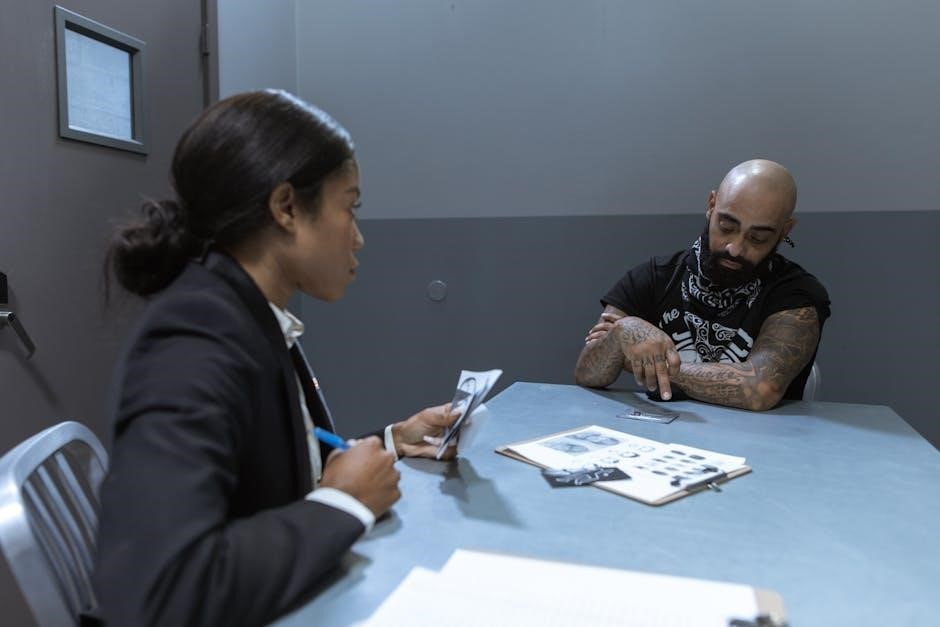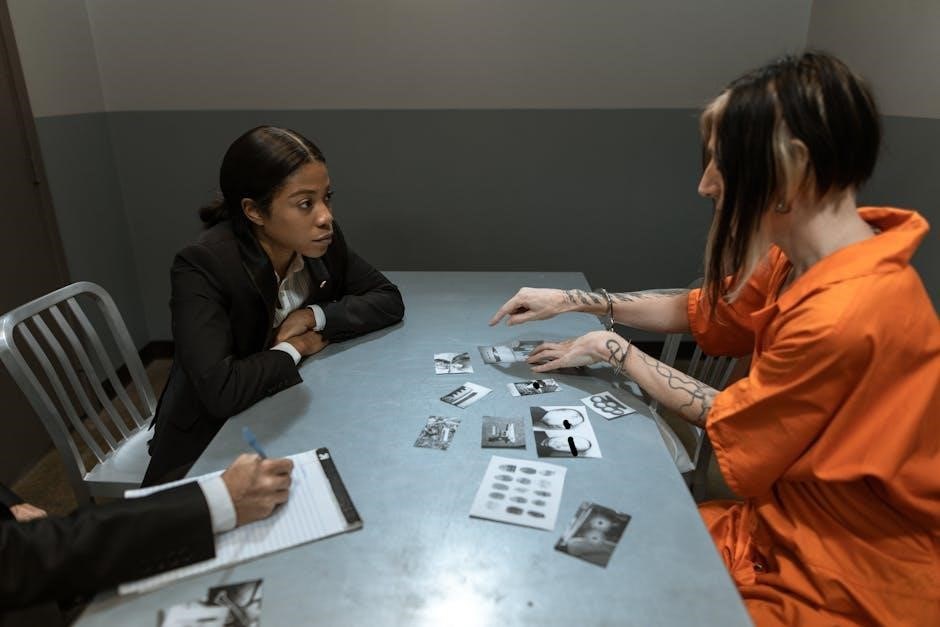security officer interview questions and answers pdf
Security officer interviews require thorough preparation to ensure candidates demonstrate their qualifications and understanding of the role. This guide provides a comprehensive overview of common questions, company-specific topics, and professional conduct expectations, helping aspirants excel in their interviews and secure positions effectively.
1.1 Overview of the Security Officer Role
A security officer ensures the safety of people, property, and assets by monitoring premises, responding to incidents, and enforcing policies. Key responsibilities include patrolling areas, operating surveillance systems, and reporting suspicious activities. Strong problem-solving, communication, and observational skills are essential; The role requires adaptability to various environments, from commercial to residential settings, and the ability to maintain order and safety effectively while adhering to legal and ethical standards.
1.2 Importance of Preparation for Security Officer Interviews
Preparation is crucial for security officer interviews, as it demonstrates professionalism and readiness. Researching the company, practicing common questions, and understanding the role’s demands helps candidates showcase their skills and confidence. A well-prepared candidate can effectively highlight their qualifications, problem-solving abilities, and alignment with the company’s values, significantly improving their chances of success in a competitive job market.
1.3 Benefits of Using a PDF Guide for Interview Preparation
A PDF guide for security officer interview preparation offers convenience and accessibility, providing a centralized resource for essential questions, answers, and tips. It allows candidates to review material anytime, ensuring thorough preparation. Such guides often include comprehensive coverage of topics, from general questions to company-specific scenarios, helping aspirants present themselves confidently and effectively during interviews.

Common Security Officer Interview Questions
Security officer interviews often include general, behavioral, and situational questions to assess experience, problem-solving skills, and adaptability. These questions help employers evaluate candidates’ suitability for the role.
2.1 General Questions About Background and Experience
General questions in security officer interviews focus on candidates’ backgrounds and experiences. Examples include, “Why do you want to be a security officer?” or “Describe your experience in security roles.” These questions help employers assess qualifications, relevant skills, and alignment with the role. Candidates should prepare to discuss their work history, training, and specific responsibilities, such as patrolling, monitoring surveillance, or handling incidents, to demonstrate their suitability for the position.
2.2 Behavioral Questions to Assess Problem-Solving Skills
Behavioral questions evaluate how candidates handle real-life situations, testing problem-solving abilities. Examples include, “Describe a time you resolved a security breach,” or “How would you handle an uncooperative visitor?” These questions assess critical thinking, calmness under stress, and effective communication. Candidates should provide specific examples from their experience, demonstrating how they prioritized tasks and maintained order in challenging scenarios, showcasing their ability to manage security-related incidents effectively.
2.3 Situational Questions Related to Security Scenarios
Situational questions simulate real-life security scenarios to gauge a candidate’s decision-making skills. Examples include, “What would you do if you noticed unauthorized access to a restricted area?” or “How would you respond to a medical emergency on-site?” These questions assess the ability to apply protocols, maintain safety, and prioritize actions effectively in high-pressure situations, ensuring the candidate can handle diverse security challenges responsibly.
Qualifications and Training for Security Officers
Security officers must hold necessary certifications, pass background checks, and maintain physical fitness. Training often includes emergency response, legal boundaries, and equipment operation, ensuring they are well-prepared for the role.
3.1 Necessary Certifications and Licenses
Security officers often require certifications like CPR/First Aid, firearm training, and emergency response. Licenses vary by region but typically involve background checks and completion of state-approved training programs. Employers may also seek additional certifications based on specific job requirements, ensuring compliance with local and national regulations.
3.2 Importance of Background Checks
Background checks are crucial for security officer roles to ensure trustworthiness and reliability. They verify criminal history, employment records, and professional references, reducing risks associated with hiring. Employers use these checks to assess candidates’ suitability for roles requiring high levels of responsibility and public trust, ensuring a safe and secure environment for clients and employees alike.
3;3 Relevance of Physical Fitness and Health
Physical fitness and health are essential for security officers, as they often require stamina to handle emergencies and prolonged patrols. Regular exercise and maintaining a healthy lifestyle ensure they can respond effectively to threats and perform their duties without fatigue, making physical fitness a critical component of their professional competence and reliability in high-pressure situations.
Technical Knowledge and Skills
Security officers must possess strong technical knowledge, including understanding protocols, operating equipment, and emergency response plans, to effectively manage security operations and ensure safety in various environments.
4.1 Understanding Security Protocols and Procedures
Understanding security protocols and procedures is crucial for officers to maintain order and safety. Protocols may include access control, emergency response, and surveillance. Familiarity with these ensures effective implementation, minimizing risks. Candidates should demonstrate knowledge of standard operating procedures, such as patrolling, incident reporting, and communication systems. Strong understanding ensures compliance, reducing liability and enhancing operational efficiency in various security environments.
4.2 Familiarity with Security Equipment and Technology
Familiarity with security equipment and technology is essential for modern security roles. Candidates should know how to operate CCTV cameras, access control systems, and alarms. Proficiency in using communication devices and software for monitoring and reporting incidents is also critical. Understanding these tools enhances situational awareness and response efficiency, making officers more effective in protecting people and assets. This expertise is often assessed during interviews to ensure competency.
4.3 Knowledge of Emergency Response Plans
Understanding emergency response plans is crucial for security officers to handle incidents effectively. This includes knowing evacuation procedures, communication protocols, and coordination with law enforcement. Familiarity with fire safety, first aid, and crisis management is essential. Regular drills and updates ensure preparedness, enabling officers to act swiftly and protect lives during critical situations, demonstrating their ability to maintain order and safety in emergencies.

Company-Specific Questions
Company-specific questions assess alignment with organizational values, understanding of security needs, and adaptability to corporate culture, ensuring candidates fit seamlessly into the firm’s operational framework and goals.
5.1 Aligning with Company Values and Policies
Aligning with company values and policies is crucial for security officers. Candidates must demonstrate understanding of the organization’s mission and ethical standards. They should explain how their work ethic and decision-making align with these principles, ensuring they contribute positively to the company’s culture and operational integrity while maintaining professionalism and adherence to guidelines in all situations encountered during their duties.
5.2 Understanding the Company’s Security Needs
Understanding the company’s security needs is vital for effective protection. Candidates should demonstrate knowledge of the organization’s unique security challenges, such as asset protection or access control. They must explain how they would assess risks, identify potential threats, and implement strategies to mitigate them, ensuring alignment with the company’s objectives and maintaining a safe, secure environment for employees, assets, and operations.
5.3 Demonstrating Adaptability to Company Culture
Demonstrating adaptability to company culture is crucial for security officers. Candidates should show willingness to align with organizational values, understand specific protocols, and communicate effectively with diverse teams. Highlighting flexibility in adapting to new procedures and maintaining professionalism in varying environments ensures seamless integration into the company’s culture, fostering trust and collaboration while upholding security standards.

Legal and Ethical Considerations
Understanding legal boundaries, addressing ethical dilemmas, and complying with regulations are vital for security officers. Ensuring lawful enforcement of policies while maintaining integrity is essential in this role.
6.1 Understanding Legal Boundaries in Security Roles
Security officers must operate within legal frameworks, respecting privacy and human rights. They are expected to avoid unlawful actions, such as unlawful detention or excessive force, ensuring their actions align with local laws and organizational policies. Understanding these boundaries ensures ethical enforcement of security protocols without overstepping authority; Proper training and awareness of legal limits are crucial for maintaining professionalism and accountability in the role.
6.2 Ethical Dilemmas in Security Situations
Security officers often face ethical dilemmas, such as handling aggressive visitors or deciding when to use force. They must balance their duty to protect with ethical considerations, ensuring actions remain lawful and respectful. Situations requiring tough decisions test their moral judgment, emphasizing the importance of training and clear guidelines to navigate these challenges effectively while maintaining integrity and public trust.
6.3 Compliance with Local and National Regulations
Security officers must adhere to local and national laws, ensuring all actions comply with legal standards. Understanding regulations is crucial for maintaining order and avoiding legal issues. Officers are trained to recognize and follow specific rules, such as weapon usage and privacy rights, ensuring professional conduct and accountability in every situation they encounter while on duty.
Physical and Mental Requirements
Security officers must possess physical stamina for patrols and emergencies, along with mental alertness for quick decision-making and managing stress in high-pressure situations effectively.
7.1 Importance of Physical Stamina and Endurance
Physical stamina and endurance are crucial for security officers, as they often require patrolling, responding to emergencies, and maintaining alertness over long shifts. Adequate fitness ensures they can pursue suspects, handle physical confrontations, and perform duties effectively without fatigue, making it a cornerstone of their ability to protect people and property safely and efficiently in demanding situations.
7.2 Mental Alertness and Decision-Making Skills
Mental alertness and sharp decision-making are vital for security officers to respond swiftly and effectively in high-pressure situations. They must assess risks, prioritize actions, and make sound judgments to ensure safety and compliance. Employers seek candidates who can remain calm, think critically, and act decisively, demonstrating their ability to handle emergencies and maintain order without hesitation or error.
7.3 Managing Stress in High-Pressure Situations
Security officers must effectively manage stress in high-pressure situations to maintain focus and professionalism. Techniques such as deep breathing, prioritizing tasks, and staying mentally disciplined help mitigate stress. Employers look for candidates who can remain composed under pressure, ensuring they make clear decisions and maintain order. Demonstrating emotional resilience and calmness is critical for excelling in this demanding role.

Tips for Acing the Security Officer Interview
Research the company, practice common questions, and present a professional demeanor to excel in your security officer interview. These strategies ensure confidence and readiness.
8.1 Researching the Company and Role
Researching the company and role is crucial for a successful security officer interview. Understanding the company’s values, security needs, and culture allows you to tailor your answers and demonstrate alignment with their goals. Familiarize yourself with the job description, responsibilities, and required skills to showcase your qualifications effectively. This preparation also helps you ask informed questions, highlighting your interest and initiative.
8.2 Practicing Common Interview Questions
Practicing common security officer interview questions is essential for building confidence and ensuring readiness. Review frequently asked questions, prepare thoughtful answers, and use resources like PDF guides for convenience. This practice helps you present yourself as a qualified candidate, addressing both general and role-specific inquiries effectively.
8.3 Presenting a Professional Demeanor
Presenting a professional demeanor is crucial for making a positive impression during security officer interviews. Arrive early, dress neatly, and maintain confident body language. Speak clearly, listen attentively, and show respect. Preparation reinforces reliability and responsibility, essential traits for the role. Utilize interview guides and PDF resources to refine your approach and showcase your professionalism effectively.
Conclude by summarizing key points, expressing gratitude, and outlining next steps. Follow up with a thank-you note and pursue continuous learning to enhance your security career prospects.
9.1 Summarizing Key Takeaways
Key takeaways include understanding common interview questions, preparing behavioral and situational responses, and researching company-specific requirements. Emphasize professionalism, physical fitness, and legal knowledge. Practice answers, maintain a positive attitude, and follow up post-interview. Continuous learning and adaptability will enhance your career growth as a security officer.
9.2 Following Up After the Interview
Following up after the interview demonstrates professionalism and enthusiasm. Send a thank-you note or email within 24 hours, reiterating your interest in the role. Politely inquire about the next steps or timeline for a decision. This proactive approach not only reinforces your candidacy but also leaves a positive impression, showcasing your commitment to the position and the employer.
9.3 Continuous Learning and Professional Development
Continuous learning is vital for security officers to stay updated on industry trends and regulations. Pursuing certifications, attending workshops, and engaging in refresher courses enhance skills and adaptability. Employers value candidates committed to professional growth, as it ensures they remain effective in dynamic security environments and can advance in their careers. Prioritize self-improvement to maintain expertise and excel in the field.
